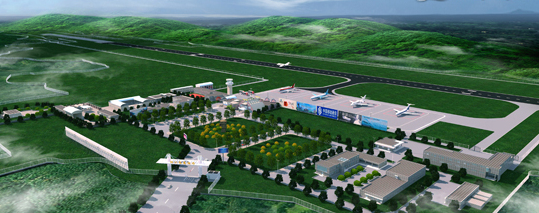
 |
|
Tongren city, southwest China's Guizhou province.[Photo provided to chinadaily.com.cn] |
One airport, two provinces and the legend of three bronze figures: Tongren is counting the ways it is preparing for an economic takeoff.
The city in southwest China's Guizhou province shares an airport in a unique arrangement with neighboring Fenghuang, a Hunan province scenic spot known as "China's most beautiful old town". The unconventional facility is a symbol of how a Chinese city that is far-flung, but endowed with natural beauty, is striving to catch up to the rest of the country's economic prosperity and poverty reduction by developing its tourism industry, said Xia Qingfeng, Tongren's top official.
"We expanded and renamed the Tongren Daxing Airport as Tongren Fenghuang Airport in 2008, and the number of air travelers surged to 350,000 last year from around 8,000 five years ago," Xia said. "We anticipate half a million will fly to visit Tongren and Fenghuang this year."
What is in short supply in many parts of China is abundant in Tongren, including pristine air and water, villages with well-preserved ethnic cultures, and extensive virgin forests, Xia said. Legend has it that some fishermen found three bronze figures in a river during the Yuan Dynasty (1271-1368), giving the city its name.
 |
|
The Tongren Fenghuang Airport in Tongren city, southwest China's Guizhou province.[Photo provided to chinadaily.com.cn] |
The mountainous city of nearly 4.5 million people is counting on tourism for an economic boom, and for improving the income of its 690,000 impoverished residents, Xia told China Daily.
To make the city more accessible to the outside world, more direct flights will be added in the coming five years to link Tongren with coastal and central provinces. The time it takes to travel by express train from Beijing will be cut, from seven hours to five, he said.
Tongren is home to 28 ethnic minority groups who make up 70 percent of its population. The city has revamped 76 villages into demonstration tourism villages that showcase the ethnic diversity of culture and lifestyle, Xia said.
Agricultural parks with star-rated scenic spots have also been built for sightseeing and to enable farmers to sell their produce to tourists, he said.
Last year, at least 30 million people traveled to Tongren, helping the tourism sector rake in revenue of 23 billion yuan ($3.5 billion).
"We are now in a tourism era, with so many better-off people wanting to see the world," Xia said. "We anticipate 'blowout growth' for the city's tourism industry, with hordes of travelers and their money flowing in this year."
Already, the number of travelers has increased by 48 percent in the first two months of this year compared to the same period in 2015, and Xia envisions a 30 percent surge in both travelers and revenue for the whole year.
Xia said Tongren's tourism sector is open to cooperation from the rest of the country and the world. Investment and tourism management expertise from private, State-owned and foreign companies are welcome.
"A booming tourism sector will help a chain of other sectors to prosper, sectors such as fitness, entertainment, retail and restaurants, and that is important for Tongren to lift its rural poor above the poverty line," he said.
Around 30,000 people are now working in the tourism industry in Tongren. Xia said the number will expand tenfold if tourism and related industries develop as designed, a great step in reducing the number of poor residents.
Another poverty-relief solution for Tongren is an increase in e-commerce in rural areas.
"For average urbanites, online shops mean one-way shopping, but rural residents need two-way online shops to help them sell farm produce while also buying conveniently," Xia said. "E-commerce offers a good solution for the rural poor to change their situations."
Villagers in Tongren have set up at least 500 online shops, each with transactions of at least 200,000 yuan, on the e-commerce platform Taobao, according to the city's official statistics.
"We plan to have each and every village in Tongren running an online shop by 2017," Xia said. "We need to improve the rural telecom infrastructure and teach farmers how to better advertise their products online."
Contact the writers at zhaohuanxin@chinadaily.com.cn